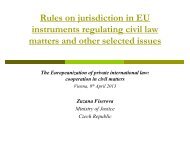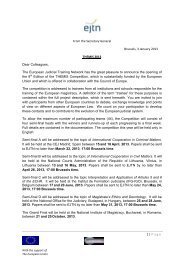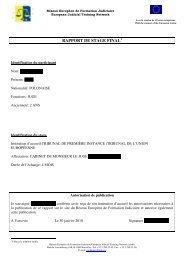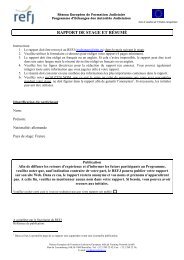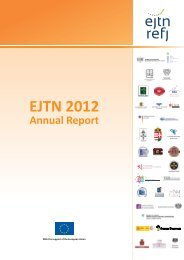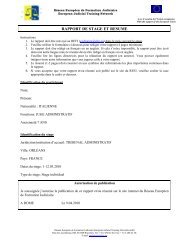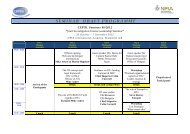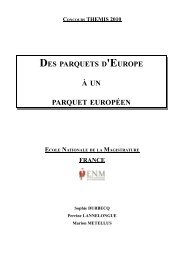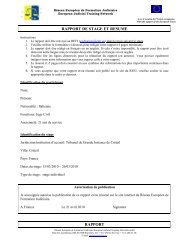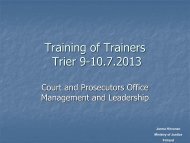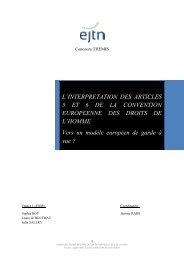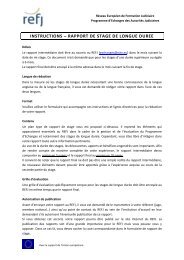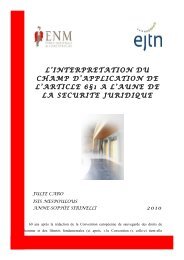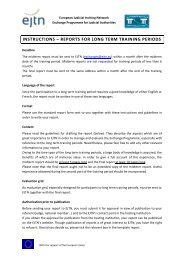Model agreement for setting up a JIT - Europol - Europa
Model agreement for setting up a JIT - Europol - Europa
Model agreement for setting up a JIT - Europol - Europa
Create successful ePaper yourself
Turn your PDF publications into a flip-book with our unique Google optimized e-Paper software.
EN<br />
C 70/2 Official Journal of the European Union 19.3.2010<br />
ENCOURAGES the competent authorities of the Member States that wish to set <strong>up</strong> a Joint Investigation Team<br />
in accordance with the terms of the Framework Decision and the Convention with competent authorities<br />
from other Member States, to use, where appropriate, the model <strong>agreement</strong> set out in the Annex to this<br />
Resolution in order to agree <strong>up</strong>on the modalities <strong>for</strong> the joint investigation team.<br />
Done at Brussels, 26 February 2010.<br />
For the Council<br />
The President<br />
F. CAAMAÑO
EN<br />
C 70/4 Official Journal of the European Union 19.3.2010<br />
from<br />
[insert date]<br />
to<br />
[insert date]<br />
The expiry date stated in this <strong>agreement</strong> may be extended by mutual consent of the parties in the <strong>for</strong>m provided <strong>for</strong><br />
in Appendix II to this model <strong>agreement</strong>.<br />
5. Member State(s) in which the <strong>JIT</strong> will operate<br />
The <strong>JIT</strong> will operate in the Member State(s) designated hereafter:<br />
[Designate Member State or States in which the <strong>JIT</strong> is intended to operate]<br />
In accordance with Article 13(3)(b) of the Convention and Article 1(3)(b) of the Framework Decision, the team shall<br />
carry out its operations in accordance with the law of the Member State in which it operates at any particular time.<br />
Should the <strong>JIT</strong> move its operational basis to another Member State, the law of this Member State shall then apply.<br />
6. <strong>JIT</strong> Leader(s) ( 1 )<br />
The parties have designated the following person, who shall be a representative of the competent authorities in the<br />
Member State(s) where the team is operating, as the leader of the <strong>JIT</strong> and under whose leadership the members of the<br />
<strong>JIT</strong> must carry out their tasks in the Member State to which he belongs:<br />
Member State<br />
On secondment from (name of<br />
body)<br />
Name<br />
Rank and affiliation (judicial,<br />
police or other competent<br />
authority)<br />
— — — —<br />
— — — —<br />
Should any of the abovementioned persons be prevented from carrying out their duties, a replacement will be<br />
designated without delay by mutual consent of the parties in an appendix to the <strong>agreement</strong>. In urgent cases, it will be<br />
sufficient <strong>for</strong> the parties to the <strong>JIT</strong> to give notification of the replacement by letter. Such notification shall<br />
subsequently be confirmed in an appendix to the <strong>agreement</strong>.<br />
7. Members of the <strong>JIT</strong><br />
In addition to the persons referred to in Article 6, the following persons ( 2 ) shall be members of the <strong>JIT</strong>:<br />
Member State<br />
On secondment from<br />
(name of body)<br />
Name/identification<br />
number ( 1 )<br />
Rank and affiliation<br />
(judicial, police or other<br />
competent authority)<br />
Role<br />
— — — — —<br />
— — — — —<br />
( 1 ) If there are good grounds <strong>for</strong> protecting the identity of one or more members of the <strong>JIT</strong>, such as, in cases of covert investigations<br />
or in cases of terrorism that require maximum security, identification numbers must be assigned to those persons, as far as it is<br />
compatible with the national legislation of the Member State, party to the <strong>agreement</strong>. The numbers assigned must be included in a<br />
confidential document. Should it not be possible to assign an identification number, it may be agreed that the identity of the<br />
members is set out in a confidential document, which is attached to this <strong>agreement</strong> and which is made available to all parties<br />
thereto.<br />
Should any of the above-mentioned persons be prevented from carrying out their duties, a replacement will be<br />
designated without delay in an appendix to this <strong>agreement</strong> or by a written notification sent by the competent leader<br />
of the <strong>JIT</strong>.<br />
( 1 ) Article 1(3)(a) of the Framework Decision shall apply, i.e. the leader of the team shall be a representative of the competent authority<br />
participating in criminal investigations from the Member State in which the team operates.<br />
( 2 ) The <strong>JIT</strong> may include representatives of judicial, police or other competent authorities with investigative functions.<br />
Under this heading, it may also include members of Eurojust when they operate as competent national authorities as referred to in<br />
Article 9f of the Council Decision 2002/187/JHA of 28 February 2002 <strong>setting</strong> <strong>up</strong> Eurojust with a view to rein<strong>for</strong>cing the fight against<br />
serious crime. These are the national members of Eurojust, their deputies and assistants — as well as other persons who, in line with<br />
their national legislation, are also members of the national office, i.e. seconded national experts.<br />
The police authorities may comprise members of the <strong>Europol</strong> national units of the Member States. These national units are based in the<br />
Member States and are national police authorities. Also the liaison officers of the Member States at <strong>Europol</strong> retain their capacity to act<br />
as national police authorities.
EN<br />
19.3.2010 Official Journal of the European Union C 70/5<br />
8. Participants in the <strong>JIT</strong><br />
The provisions on participants ( 1 ) in the <strong>JIT</strong> are dealt with in the relevant appendix to this <strong>agreement</strong>.<br />
9. Evidence<br />
The parties entrust the leader or a member (s) of the <strong>JIT</strong> with the task of giving advice on the obtaining of evidence.<br />
His or her role includes providing guidance to members of the <strong>JIT</strong> on aspects and procedures to be taken into<br />
account in the taking of evidence. The person(s) who carry out this function should be indicated here.<br />
In the OAP the parties may in<strong>for</strong>m each other about giving testimony by members of the <strong>JIT</strong>.<br />
10. General Conditions of the Agreement<br />
In general, the conditions laid down in Article 13 of the Convention and the Framework Decision shall apply as<br />
implemented by each Member State in which the <strong>JIT</strong> operates.<br />
11. Amendments to the <strong>agreement</strong><br />
Amendments to this <strong>agreement</strong>, including but not limited to the following:<br />
(a) the incorporation of new members of the <strong>JIT</strong>;<br />
(b) changes to the purpose provided <strong>for</strong> in Article 2 of this <strong>agreement</strong>;<br />
(c) additions or changes to the current articles.<br />
shall take the <strong>for</strong>m provided <strong>for</strong> in Appendix III to this model <strong>agreement</strong>, shall be signed by the parties and shall be<br />
attached to the original version.<br />
12. Internal evaluation<br />
Every six months at least, the <strong>JIT</strong> leaders shall evaluate the progress achieved as regards the general purpose of the<br />
<strong>JIT</strong>, while determining and addressing any problems thus identified.<br />
After the operation of the <strong>JIT</strong> ends, the parties may, where appropriate, arrange a meeting to evaluate the<br />
per<strong>for</strong>mance of the <strong>JIT</strong>.<br />
The <strong>JIT</strong> may draw <strong>up</strong> a report on the operation, which may show how the operational action plan was implemented<br />
and which results were achieved.<br />
13. Specific arrangements of the <strong>agreement</strong> (in order to avoid making the <strong>agreement</strong> too cumbersome some or all<br />
points indicated under 13.1-13.11 may be located in OAP).<br />
The following special arrangements may apply to this <strong>agreement</strong> (note that a number of these aspects are also<br />
regulated in the Convention and the Framework Decision):<br />
(To be inserted, if applicable. The following sub-chapters are intended to highlight possible areas that need to be<br />
specifically described).<br />
13.1. Terms under which seconded members of the <strong>JIT</strong> may be excluded when investigative measures are<br />
taken.<br />
13.2. Specific conditions under which seconded members may carry out investigations within the MS of<br />
operation.<br />
13.3. Specific conditions under which a seconded member of a <strong>JIT</strong> may request his/her own national<br />
authorities to take measures which are requested by the team without submitting a letter of request.<br />
( 1 ) Participants in the <strong>JIT</strong> are designated by third countries, Eurojust, <strong>Europol</strong>, the Commission (OLAF), bodies competent by virtue of<br />
provisions adopted within the framework of the Treaties and international organisations which participate in the activities of the <strong>JIT</strong>, as<br />
parties to the <strong>agreement</strong> provided <strong>for</strong> in Appendix I to this model Agreement.
EN<br />
C 70/6 Official Journal of the European Union 19.3.2010<br />
13.4. Conditions under which seconded members may share in<strong>for</strong>mation derived from seconding authorities.<br />
13.5. Provisions concerning the media, in particular the need <strong>for</strong> consultation prior to the presentation of<br />
press releases and official in<strong>for</strong>mation briefings.<br />
13.6. Provisions concerning the confidentiality of this <strong>agreement</strong>.<br />
13.7. The language to be used <strong>for</strong> communication must be defined.<br />
13.8. Specific provisions on expenditure:<br />
13.8.1. Provisions on insurance <strong>for</strong> seconded members of the <strong>JIT</strong>;<br />
13.8.2. Provisions concerning expenditure on translation/interpreting/telephone tapping, etc.<br />
13.8.3. Provisions on the translation of, <strong>for</strong> example, the documents obtained into the language of<br />
other members of the <strong>JIT</strong>, as well as into the official language of communication (if different),<br />
since this can entail considerable (unnecessary) expenditure;<br />
13.8.4. Provisions concerning expenses or income arising from seized assets.<br />
13.9. Conditions under which assistance sought under the Convention and other arrangements may be<br />
given.<br />
13.10. Specific data protection rules.<br />
13.10.bis Confidentiality and use of in<strong>for</strong>mation already existing and/or obtained during the operation of the <strong>JIT</strong>.<br />
13.11. Conditions under which seconded members may carry/use weapons.<br />
Done at (place of signature), (date)<br />
(Signatures of all parties)
EN<br />
19.3.2010 Official Journal of the European Union C 70/7<br />
Appendix I<br />
TO THE MODEL AGREEMENT ON THE ESTABLISHMENT OF A JOINT INVESTIGATION TEAM<br />
Participants in a <strong>JIT</strong><br />
Arrangement with <strong>Europol</strong>/Eurojust/the Commission (OLAF), bodies competent by virtue of provisions adopted within<br />
the framework of the Treaties, other international bodies or third countries<br />
1. Parties to the arrangement<br />
Name of the first party to the <strong>agreement</strong> that is not a Member State<br />
Name of the last party to the <strong>agreement</strong> that is not a Member State (if there is more than one)<br />
and<br />
Name of the first competent agency/administration of a Member State as a party to the <strong>agreement</strong><br />
and<br />
Name of the second competent agency/administration of a Member State as a party to the <strong>agreement</strong><br />
(… and …)<br />
have agreed that the following persons from (names of the parties to the <strong>agreement</strong> that are not Member States) will participate<br />
in the joint investigation team, established by <strong>agreement</strong> on … (date and place of the <strong>agreement</strong> to which this appendix is<br />
attached).<br />
2. Participants in the <strong>JIT</strong><br />
The following persons will participate in the <strong>JIT</strong>:<br />
State/Organisation<br />
On secondment from<br />
(name of agency/body)<br />
Name Rank and affiliation Role<br />
— — — — —<br />
— — — — —<br />
The Member State … has decided that its national members of Eurojust will participate in the joint investigation team as<br />
a competent national authority ( 1 ).<br />
Should any of the above-mentioned persons be prevented from carrying out their duties, a replacement will be designated<br />
in an appendix to this <strong>agreement</strong>. In urgent cases, it will be sufficient <strong>for</strong> the party to give notification of the replacement<br />
by letter. Such notification shall subsequently be confirmed in an appendix to the <strong>agreement</strong>.<br />
( 1 ) Delete this paragraph if not applicable.
EN<br />
C 70/8 Official Journal of the European Union 19.3.2010<br />
3. Specific arrangements<br />
The participation of the above-mentioned persons will be subject to the following conditions and only <strong>for</strong> the following<br />
purposes:<br />
3.1. First party to the <strong>agreement</strong> that is not a Member State<br />
3.1.1. Purpose of participation<br />
3.1.2. Rights conferred (if any)<br />
3.1.3. Provisions concerning costs<br />
3.1.4. Specific provisions concerning or enabling achievement of the purpose of participation<br />
3.1.5. Other specific provisions or conditions ( 1 )<br />
3.1.6. Specific data protection rules<br />
3.2. Second party to the <strong>agreement</strong> that is not a Member State (if applicable)<br />
3.2.1. …<br />
4. Specific arrangements related to the participation of <strong>Europol</strong> ( 2 )<br />
4.1. Principles of participation<br />
4.1.1. <strong>Europol</strong> staff participating in the <strong>JIT</strong> shall assist the members of the team in accordance with the <strong>Europol</strong> Decision<br />
and in accordance with the national law of the Member State where the team operates.<br />
4.1.2. The <strong>Europol</strong> staff participating in the <strong>JIT</strong> shall work under the guidance of the leader(s) of the team as identified in<br />
point […] of the Agreement and shall provide any assistance necessary to achieve the objectives and purpose of<br />
the <strong>JIT</strong>, as identified by the leader(s) of the team.<br />
4.1.3. <strong>Europol</strong> staff has the right not to per<strong>for</strong>m tasks which they consider to be in breach of their obligations under the<br />
<strong>Europol</strong> Decision. In that case, the <strong>Europol</strong> staff member shall in<strong>for</strong>m the Director or his representative thereof.<br />
<strong>Europol</strong> shall consult with the leader(s) of the team with a view to finding a mutually satisfactory solution.<br />
4.1.4. <strong>Europol</strong> staff participating in the <strong>JIT</strong> shall not be involved in the taking of any coercive measures. However,<br />
participating <strong>Europol</strong> staff can, under the guidance of the leader(s) of the team, be present during operational<br />
activities of the <strong>JIT</strong>, in order to render on-the-spot advice and assistance to the members of the team who execute<br />
coercive measures, provided that no legal constraints exist at national level where the team operates.<br />
4.1.5. Article 11(a) of the Protocol on the Privileges and Immunities of the European Union shall not apply to <strong>Europol</strong><br />
staff participating in the <strong>JIT</strong> ( 3 ).<br />
( 1 ) For example, references to basic or applicable legal frameworks, etc.<br />
( 2 ) To be included only where <strong>Europol</strong> is a participant to the <strong>JIT</strong>. These rules were adopted by the <strong>Europol</strong> Management Board on 9 July<br />
2009 (file No 3710-426r6) and a model <strong>JIT</strong> arrangement was adopted by the <strong>Europol</strong> Management Board on 18 November 2009 (file<br />
No 2610-74r2), as required under Article 6(2) of the <strong>Europol</strong> Decision. For <strong>up</strong>dated in<strong>for</strong>mation please refer to the <strong>Europol</strong>'s website:<br />
http://www.europol.europa.eu<br />
( 3 ) Protocol on the Privileges and Immunities of the European Union (consolidated version) (OJ C 115, 9.5.2008, p. 266).
EN<br />
19.3.2010 Official Journal of the European Union C 70/9<br />
4.1.6. During the operations of the <strong>JIT</strong>, <strong>Europol</strong> staff shall, with respect to offences committed against or by them, be<br />
subject to the national law of the Member State of operation applicable to persons with comparable functions.<br />
4.2. Type of assistance<br />
4.2.1. Participating <strong>Europol</strong> staff will provide full range of <strong>Europol</strong>’s s<strong>up</strong>port services, in accordance with the <strong>Europol</strong><br />
Council Decision as far as required or requested. Those will include, inter alia, operational and strategic analytical<br />
s<strong>up</strong>port, in particular through the analysis work file(s) (AWF) (name(s) of the work file(s) and related projects).<br />
Where required and when requested by the leader(s) of the team, <strong>Europol</strong> may s<strong>up</strong>port the <strong>JIT</strong> by deployment of a<br />
<strong>Europol</strong> ‘mobile office’ or of other technical equipment, if available and in compliance with <strong>Europol</strong>’s security<br />
standards.<br />
4.2.2. <strong>Europol</strong> staff participating in the <strong>JIT</strong> may assist in all activities, in particular by providing a communication<br />
plat<strong>for</strong>m, strategic, technical and <strong>for</strong>ensic s<strong>up</strong>port and tactical and operational expertise and advice to the<br />
members of the <strong>JIT</strong>, as required by the leader(s) of the team.<br />
4.2.3. <strong>Europol</strong> shall, within the boundaries of its legal framework facilitate the secure exchange of in<strong>for</strong>mation between<br />
the parties of the <strong>JIT</strong> and non-participating States and/or EU bodies and international organisations, if requested by<br />
the leader(s) of the team.<br />
4.3. Access to <strong>Europol</strong> in<strong>for</strong>mation processing systems<br />
4.3.1. <strong>Europol</strong> staff participating in the <strong>JIT</strong> shall have access to <strong>Europol</strong>’s in<strong>for</strong>mation processing systems, referred to in<br />
Article 10 of the <strong>Europol</strong> Decision. This access shall be in accordance with the provisions of the <strong>Europol</strong> Decision<br />
and in line with the applicable security and data protection standards <strong>for</strong> the duration of their membership of the<br />
<strong>JIT</strong>.<br />
4.3.2. <strong>Europol</strong> staff may liaise directly with members of the <strong>JIT</strong> and provide members and seconded members of the <strong>JIT</strong>,<br />
in accordance with the <strong>Europol</strong> Decision, with in<strong>for</strong>mation from any of the components of the in<strong>for</strong>mation<br />
processing systems referred to in Article 10 of the <strong>Europol</strong> Decision. The conditions and restrictions on the<br />
use of this in<strong>for</strong>mation must be respected.<br />
4.3.3. In<strong>for</strong>mation obtained by a <strong>Europol</strong> staff member while part of the <strong>JIT</strong> may be, with the consent and under the<br />
responsibility of the Member State which provided the in<strong>for</strong>mation, included in any of the components of the<br />
in<strong>for</strong>mation processing systems referred to in Article 10 of the <strong>Europol</strong> Decision, under the conditions laid down<br />
therein.<br />
4.4. Costs and equipment<br />
4.4.1. The Member State in which investigative measures are taking place is responsible <strong>for</strong> providing the technical<br />
equipment (office accommodation, telecommunication etc.) necessary <strong>for</strong> the accomplishment of the tasks and<br />
shall pay the costs incurred. The respective Member State shall also provide office communication and other<br />
technical equipment necessary <strong>for</strong> the (encrypted) exchange of data. The costs are to be paid by that Member State.<br />
4.4.2. <strong>Europol</strong> shall cover the costs incurred as a result of the participation of <strong>Europol</strong> staff in the <strong>JIT</strong>, in particular<br />
concerning insurance and salaries <strong>for</strong> staff as well as accommodation and travel costs. <strong>Europol</strong> shall also bear the<br />
costs <strong>for</strong> the special equipment mentioned in points 4.1 and 4.2 above.<br />
Date/signatures ( 1 )<br />
( 1 ) Signatures of the parties to this arrangement.
EN<br />
C 70/10 Official Journal of the European Union 19.3.2010<br />
Appendix II<br />
TO THE MODEL AGREEMENT ON THE ESTABLISHMENT OF A JOINT INVESTIGATION TEAM<br />
Agreement to extend a joint investigation team<br />
In accordance with Article 13(1) of the Convention on Mutual Assistance in Criminal Matters between the Member States<br />
of the European Union of 29 May 2000 ( 1 ) and Article 1(1) of the Council Framework Decision of 13 June 2002 on joint<br />
investigation teams ( 2 ):<br />
The parties have agreed to extend the joint investigation team (hereinafter ‘<strong>JIT</strong>’) set <strong>up</strong> by <strong>agreement</strong> of [insert date] done at<br />
[insert place of signature], a copy of which is attached hereto.<br />
The parties consider that the <strong>JIT</strong> should be extended beyond the period <strong>for</strong> which it was set <strong>up</strong> [insert date on which period<br />
ends] since its purpose as established in Article [insert article on purpose of <strong>JIT</strong> here] has not yet been achieved.<br />
The circumstances requiring the <strong>JIT</strong> to be extended have been carefully examined by all the parties. The extension of the<br />
<strong>JIT</strong> is considered essential to the achievement of the purpose <strong>for</strong> which the <strong>JIT</strong> was set <strong>up</strong>.<br />
The <strong>JIT</strong> will there<strong>for</strong>e remain in operation until [insert date on which new period ends]. The above period may be extended<br />
further by the parties by mutual <strong>agreement</strong>.<br />
Date/Signature<br />
( 1 ) OJ C 197, 12.7.2000, p. 3.<br />
( 2 ) OJ L 162, 20.6.2002, p. 1.
EN<br />
19.3.2010 Official Journal of the European Union C 70/11<br />
Appendix III<br />
TO THE MODEL AGREEMENT ON THE ESTABLISHMENT OF A JOINT INVESTIGATION TEAM<br />
Suggested wording <strong>for</strong> changes other than the period <strong>for</strong> which a <strong>JIT</strong> is set <strong>up</strong><br />
In accordance with Article 13(1) of the Convention on Mutual Assistance in Criminal Matters between the Member States<br />
of the European Union of 29 May 2000 ( 1 ) and Article 1(1) of the Council Framework Decision of 13 June 2002 on joint<br />
investigation teams ( 2 ), under which the present joint investigation team was set <strong>up</strong>:<br />
The parties have agreed to amend the written <strong>agreement</strong> <strong>setting</strong> <strong>up</strong> a joint investigation team (hereinafter ‘<strong>JIT</strong>’) of [insert<br />
date], done at [insert place], a copy of which is attached hereto.<br />
The signatories have agreed that the above <strong>agreement</strong> should be amended as follows:<br />
1. (Amendment …)<br />
2. (Amendment …)<br />
The circumstances requiring the <strong>JIT</strong> <strong>agreement</strong> to be amended have been carefully examined by all the parties. The<br />
amendment(s) to the <strong>JIT</strong> <strong>agreement</strong> is/are deemed essential to achieve the purpose <strong>for</strong> which the <strong>JIT</strong> was set <strong>up</strong>.<br />
Date/Signature<br />
( 1 ) OJ C 197, 12.7.2000, p. 3.<br />
( 2 ) OJ L 162, 20.6.2002, p. 1.
EN<br />
C 70/12 Official Journal of the European Union 19.3.2010<br />
Appendix IV<br />
Proposal <strong>for</strong> a check list <strong>for</strong> the Operational Action Plan (OAP) ( 1 )<br />
The following points may be addressed by the parties:<br />
Introduction — describe the purpose of the <strong>JIT</strong>. The text used under ‘purpose of the <strong>JIT</strong>’ in the <strong>JIT</strong> <strong>agreement</strong> would<br />
normally be sufficient<br />
Operational procedure — identify the location(s) where the <strong>JIT</strong> is likely to operate, describe how the <strong>JIT</strong> will be<br />
managed and the investigation conducted, taking note of national legislation, guidelines and procedure<br />
Role of members and/or participants of the <strong>JIT</strong> — identify and describe the different operational roles and tasks of<br />
each member and/or participant in the <strong>JIT</strong> (EU MS, <strong>Europol</strong>, Eurojust, OLAF) if not yet described in the <strong>JIT</strong> <strong>agreement</strong><br />
Special or specific measures to be implemented — identify and describe investigative activity that requires special<br />
measures or procedure e.g. child suspects, victims, dangerous/hostile working environment<br />
Operations and investigative powers — identify and describe special operations/investigative techniques that will be<br />
employed during the investigation e.g. intrusive surveillance, in<strong>for</strong>mants, undercover officers, communication intercepts<br />
etc. and related legislation/procedure<br />
In<strong>for</strong>mation exchange and communication — describe how in<strong>for</strong>mation will be exchanged and the procedures <strong>for</strong><br />
communication and identify competent partner or agency e.g. <strong>Europol</strong>, Eurojust, OLAF, SECI, Interpol; it may be<br />
necessary to agree <strong>up</strong>on a language of communication; consider the use of <strong>Europol</strong>’s secure means of communication<br />
(SIENA) and the Analytical Work Files (AWFs) as a means <strong>for</strong> a secure environment to store sensitive in<strong>for</strong>mation<br />
Intelligence assessment and tasking — describe the process of intelligence collection and development and any related<br />
guidelines<br />
Financial investigations — consider the need <strong>for</strong> following the ‘money trail’<br />
Evidence gathering — identify according to the jurisdiction(s) any legislation, guidelines, procedure etc. which must be<br />
taken into account including responsible agency/individual, requirement to translate evidence<br />
Prosecution — identify the competent authority in each country/jurisdiction and any guidelines related to decisions to<br />
prosecute including the role of Eurojust in this respect<br />
Testimony — identify the likelihood and procedures in place <strong>for</strong> each jurisdiction in respect of the requirement <strong>for</strong> <strong>JIT</strong><br />
members to give evidence<br />
Disclosure — describe the rules and procedures <strong>for</strong> all jurisdictions where the <strong>JIT</strong> is likely to operate<br />
Operational and strategic meetings — identify and describe the meetings that will take place, their frequency and<br />
participants<br />
Administration and logistics — any issues concerning administration, equipment (such as office accommodation,<br />
vehicles, IT equipment or any other technical equipment), resources, personnel, media, confidentiality issues, etc.<br />
should be dealt with here:<br />
— Translation<br />
— Office accommodation<br />
— Vehicles<br />
— Other technical equipment<br />
( 1 ) The content of the OAP is a living document reflecting the practical issues of a <strong>JIT</strong>. The OAP should be coherent with section 13<br />
‘Specific arrangements’ of the <strong>JIT</strong> Agreement. Some elements of section 13 may be located in the OAP.



